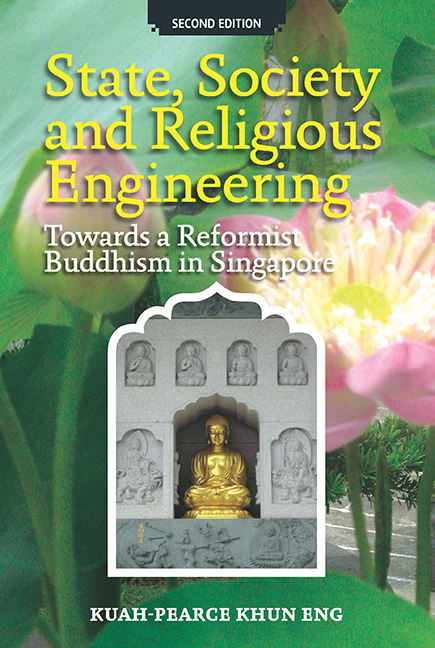Book contents
- Frontmatter
- Contents
- List of Diagrams
- Note on Romanisation
- Preface to the Second Edition
- Acknowledgements to the Second Edition
- Introduction
- PART 1 INVENTING A RELIGIOUS TRADITION
- PART 2 STATE, SOCIETY AND RELIGIOUS ENGINEERING
- PART 3 TOWARDS A REFORMIST BUDDHISM
- 7 Towards a Reformist Buddhism
- 8 Members and Their Religiosity
- 9 Competing Claims of Modernity and Class Identity: Christianity versus Reformist Buddhism
- Conclusion
- Postscript to the Second Edition: Towards a Humanist and Socially-engaged Buddhism
- Glossary
- Bibliography
- Index
9 - Competing Claims of Modernity and Class Identity: Christianity versus Reformist Buddhism
from PART 3 - TOWARDS A REFORMIST BUDDHISM
Published online by Cambridge University Press: 21 October 2015
- Frontmatter
- Contents
- List of Diagrams
- Note on Romanisation
- Preface to the Second Edition
- Acknowledgements to the Second Edition
- Introduction
- PART 1 INVENTING A RELIGIOUS TRADITION
- PART 2 STATE, SOCIETY AND RELIGIOUS ENGINEERING
- PART 3 TOWARDS A REFORMIST BUDDHISM
- 7 Towards a Reformist Buddhism
- 8 Members and Their Religiosity
- 9 Competing Claims of Modernity and Class Identity: Christianity versus Reformist Buddhism
- Conclusion
- Postscript to the Second Edition: Towards a Humanist and Socially-engaged Buddhism
- Glossary
- Bibliography
- Index
Summary
INTRODUCTION
In Singapore, a person's religious identity is closely linked to one's class identity. Among the four main religions in Singapore, Christianity is seen as a high class religion and those who identified themselves as Christian are by association from the middle and upper classes of society. This link between class and religion also has its roots during the early years of British colonial rule and this link continues to play an important role in contemporary Singapore.
This chapter will examine the competing claims of modernity and class identity of two religious groups – Christianity and Reformist Buddhism – and how they used these claims of modernity and class identity to compete for membership within the Chinese community.
CHANGING RELIGIOUS LANDSCAPE
Since the late 1970s, the presence of numerous Christian evangelical groups such as the Billy Graham Crusaders, Pentacostalists and Charismatics has resulted in aggressive proselytisation in Singapore, something that was not seen during the earlier years. Their success in attracting members of the public to their activities and their increased membership has resulted in heightened tension among the various religious groups and upset the ethno-religious balance between these evangelical Christian groups and the established religions. At the same time, there was also the emergence of Islamic Fundamentalism in Singapore. The rapid growth of various religious groups has prompted the government to take a close interest in their activities. Likewise government-commissioned research on religion has also come to the forefront in an attempt to understand religious revivalism in Singapore (Kuo, Quah and Tong, 1988).
Aggressive proselytisation coincided with a period of rapid economic and social change in Singapore. Such changes have resulted in a reassessment of the religious and spiritual needs of the younger Singaporeans. In a survey conducted among university students, it was found that the Chinese students had begun to question the usefulness of traditional Shenist religious practices (Nyce 1972: 30). One reason for switching from one type of religion to another is the existence of a cultural crisis where the norms, values and beliefs of the religious system that the individual was brought up with are no longer relevant to the needs of the individual (Wuthnow 1979). One form of cultural crisis has been associated with the increasing rate of intercultural marriages.
- Type
- Chapter
- Information
- State, Society and Religious EngineeringTowards a Reformist Buddhism in Singapore (Second Edition), pp. 271 - 290Publisher: ISEAS–Yusof Ishak InstitutePrint publication year: 2009



